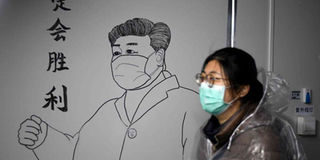Covid-19: Under-pressure China stays put as Africans protest

A woman wearing a face mask walks in front of a drawing of Chinese President Xi Jinping on a wall at the Leishenshan Hospital that had offered beds for coronavirus patients in Wuhan, in China’s central Hubei province on April 11, 2020. PHOTO | NOEL CELIS | AFP
What you need to know:
- Mr Zhao Lijian, the Spokesperson at the Chinese Ministry of Foreign Affairs told the media on Sunday his country doesn’t not condone “differential treatment” of foreigners.
- The Kenya Diaspora Alliance, a founding member of the nascent Africa Diaspora Alliance, has demanded a stop to the mistreatments, even though it admitted no Kenyan had directly complained of falling victims.
- But the Chinese won’t relent. Among the measures include foreigners being tested in masses using a method called nucleic acid test (NAT), which detects the genetic material of a microorganism in blood.
Chinese authorities have vowed to continue with tough prevention measures against covid-19, even as they pledged to “improve” on the treatment of Africans living there.
Under pressure from African leaders, and the global community, for allegedly mistreating black people, Chinese officials said they will mend their dealings. But they indicate they won’t relent in preventing what they called “imported” cases of covid-19.
Mr Zhao Lijian, the Spokesperson at the Chinese Ministry of Foreign Affairs told the media on Sunday his country doesn’t not condone “differential treatment” of foreigners.
He spoke after controversy in Guanghzhou, the capital of southern province of Guangdong, here Africans were protesting being thrown out of their residential arears despite honouring their tenancy agreements
“The Guangdong authorities attach great importance to some African countries’ concerns and are working promptly to improve their working method,” Mr Zhao said.
TOUGH MEASURE
That method, he argued, will include providing equal health services, providing affordable quarantine hotels and communicating better with diplomatic missions.
It excluded stopping any preventive measures, some of which have been controversial, such as granting foreigners special medical cards certifying negative coronavirus status, and which is used for admittance to restaurants or markets.
It is a measure Chinese officials say will stop importation of the virus back to where it all began. China has had 82, 160 cases of covid-19 ever since it began there in late December.
But official records show some 77, 663 people have fully recovered and 3341 died, leaving 1,156 patients in hospital. Beijing says Guandong Province has since imported 119 cases of covid-19, forcing authorities into a crackdown.
“Both Chinese and foreigners are required to observe local anti-epidemic regulations,” a dispatch from the Chinese Embassy in Kenya indicated, even as it insisted no Kenyan had been maltreated over the virus.
The decision to toughen regulations though has elicited an outcry, especially from African governments, the African Union and diaspora rights groups.
DIASPORA DEMAND
The Kenya Diaspora Alliance, a founding member of the nascent Africa Diaspora Alliance, has demanded a stop to the mistreatments, even though it admitted no Kenyan had directly complained of falling victims.
“Our concern for diasporas transcend to those currently in epicentres across the globe. We detest in the strongest terms the current mistreatment of persons of African descent in China,” said Dr Shem Ochuodho, the Global Chairperson for KDA.
“We stand in full solidarity with our African sisters and brothers in China who have had to tolerate the barbaric acts we have seen on our screens and social media the past few days. If there was a time China needed to show its greatest friendship and empathy with Africa, it is now!”
KDA asked Kenyans around the world caught up in the lockdowns to contact the alliance through official contacts on its website, and social media accounts.
Moussa Faki Mahamat on April 11 summoned Chinese Ambassador to the continental body Mr Liu Yuxi, “to express our extreme concern at allegations of maltreatment of Africans in Guangzhou and called for immediate remedial measures in line with our excellent relations.”
NO RELENTING
But the Chinese won’t relent. Among the measures include foreigners being tested in masses using a method called nucleic acid test (NAT), which detects the genetic material of a microorganism in blood.
That test, some medical researchers say, is useful in detecting a disease early; but it can give data beyond covid-19 status, by showing blood count and other existing ailments like AIDS or Hepatitis B.
Africans protesting this method say it could be used as a profiling tool against them for a possible deportation. Yet the Chinese were also demanding that landlords let only to foreigners with special medical cards—certificates that one was free of the virus.
Those certificates were obtained through forced quarantine, at own cost, for 14 days, after which one had to endure four subsequent tests. In total, one could stay in an hotel for up to four weeks, should anyone in the quarantined group test positive.
In Guangzhou, landlords afraid of running into trouble with the government have ended up throwing tenants out for lack of the card. The mass testing and tougher measures were expected in Beijing and Shanghai later in the week.
Kenya, Nigeria, Uganda, South Africa and Rwanda are among the countries that asked China to protect Africans. The Africa Group of Ambassadors in Beijing was also expected to file a formal protest note to China this week.





